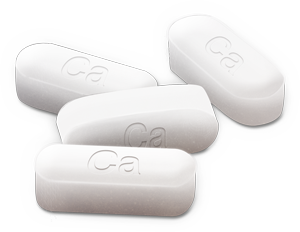Obesity and calcium
Low calcium intake is considered a contributing factor to obesity and associated co-morbidities such as hypertension. Insulin Resistance Syndrome has been hypothesized to develop as a result of low calcium intake. A healthy calcium intake facilitates the excretion of fecal fat and may help increase core body temperature. In this respect, dietary calcium from dairy products offers better results than that from calcium supplements. This suggests an important role for dairy products in controlling obesity.
Kale and Other Leafy Greens are Excellent Sources of Calcium

Calcium and human metabolism
Calcium is a mineral with alkaline properties. It is an essential element for human life. 99% of the calcium in the human body is present in the teeth and bones. The remaining one percent is found in blood, nerve cells, and body tissue. The average adult human body contains about one kilogram of calcium. It is the most abundant mineral in the human body.
Calcium is essential for growth, maintenance, and reproduction. It is popularly and commonly associated with healthy teeth and bones. Muscle contraction, impulse transmission through the nervous system, hormone secretion, the expansion and contraction of blood vessels are some of the other functions in which the mineral plays a role.
Calcium ingested during the growing up years helps build strong bones. Adults achieve peak bone mass at the age of around 30 years. Adequate calcium intake to ensure optimum bone mass helps delay the onset of bone loss that occurs with age. Osteoporosis, or the condition in which bones turn fragile and porous, is a serious concern and a leading contributor to fractures of the hip, wrist, pelvis, rib, and vertebrae. Exercise and regular intake of calcium and vitamin D can keep osteoporosis at bay.
Clinical trials have shown that there is a link between healthy calcium intake and lowering of blood pressure. A diet that contains adequate amounts of minerals such as calcium, potassium, and magnesium plus fiber helps stave off hypertension. When dairy products are added to this diet, it helps bring down existing hypertension.
Calcium Supplementation Post Bariatric Surgery
Calcium Supplements

Calcium deficiency is already very common and may be worsened by bariatric surgery if proper guidelines are not followed. Intestinal calcium absorption is affected after surgery. In fact, after two years, calcium deficiency develops in up to about half of patients that have undergone malabsorptive bariatric surgery. Lifelong adherence to dietary norms is very important to maintain calcium levels in the body. The chances of osteoporosis in older patients post bariatric surgery increase. Management involves supplementation of calcium, vitamin D, and bisphosphonates. The last mentioned item is sometimes given to individuals with low bone density.
Need for calcium supplementation
Calcium deficiency leads to osteoporosis. Senior citizens and post-menopausal women are at increased risk. Adequate calcium supplements are particularly prescribed for this group of citizens. Underactive parathyroid glands result in improper regulation of calcium, phosphorous, and vitamin D. Calcium supplementation is prescribed to treat this condition, which is known as hypoparathyroidism.
Other groups vulnerable to calcium deficiency include heavy drinkers, patients taking corticosteroids, and those with malabsorption problems due to Crohn's disease, celiac disease, and gastric bypass surgery involving intestinal resection. Rickets, which causes a softening of bones in children, is a condition caused by vitamin D deficiency. Recent research has shown that calcium supplementation can help in the treatment process. Preliminary population-based studies show that calcium supplementation helps to counter strokes as well as cholesterol.
Obese individuals taking anti-inflammatory corticosteroids for obesity-related arthritis, aluminum containing antacids, or thyroid hormones risk urinary and stool calcium loss. Sodium, protein, and caffeine also increase urinary loss of calcium. This can be countered by including potassium in diet.
Bariatric surgery and calcium balance
Hyperparathyroidism or an increase in the PTH hormone is commonly observed in individuals that have undergone bariatric surgery. The thyroid gland plays an important role in the regulation of blood calcium. This condition can impede the thyroid gland from maintaining a calcium balance. It is characterized by vitamin D deficiency, osteoporosis, and negative calcium balance. Treatment involves medicines and vitamin D supplementation. In order to ensure that calcium balance is maintained, calcium supplementation usually starts soon after the surgery.
Calcium citrate with vitamin D is given in chewable or liquid form. The mineral is better tolerated in these forms as against when given as tablets. In order to improve intestinal absorption, it is recommended that the supplements be taken along with food. The calcium may also be taken mixed with light yogurt or whey and soy powder.
It is important to keep in mind that calcium and iron share a nutrient-nutrient inhibitory absorptive interaction. Iron absorption in post-surgery anemic patients can be inhibited to up 50% and more if the iron supplements are taken along with calcium supplements or dairy products. The inhibiting effects of calcium phosphate, calcium citrate, and calcium carbonate on iron, zinc, and magnesium have been noticed in studies.
After a gastric bypass, a 24-hour urine test may help evaluate metabolic abnormalities that occur with the bones if renal stones are prevalent. The test informs on the status of calcium excretion by the kidneys. Hyperoxaluria or kidney stones are indicated by excessive calcium in urine.
There is evidence to suggest that patients with no previous history of kidney stones are at risk from calcium stones in the kidney after bariatric surgery. Post-bariatric surgery calcium supplementation has to be carried out keeping in mind the problems associated with excessive calcium build-up in the body. Also, the role of stomach acids in absorbing nutrients is affected because of stomach-stapling procedures. Calcium carbonate supplements are known to neutralize stomach acids thereby hindering the absorption of Vitamin B12.
On the other hand, hypocalcemia or abnormally low levels of calcium in the blood is a serious condition and can develop due to kidney malfunction, hypoparathyroidism, or a deficiency of vitamin D. In this regard, perioperative dietary care is crucial as it prepares the foundation for long-term diet management.
Natural Sources of Calcium
Milk and low-fat dairy products are excellent sources of calcium. Leafy greens are amongst the best sources of natural calcium; these include spinach, collard green, and mustard green. Dairy products, blackstrap molasses, celery, broccoli, sesame seeds, and cabbages are other good sources of calcium. A daily intake of 2500mg of calcium is considered to be a Tolerable Upper Intake Level (UL) for a healthy individual. This includes calcium from both food items and dietary supplements.
A good thing about calcium is that unlike many other nutrients excessive cooking does not affect its nutritional properties. Dietary fiber such as that found in wheat and oat bran can reduce intestinal absorption of calcium. Nuts and legumes contain phytic acid that can bind to the calcium to form an insoluble complex thereby decreasing the amount of calcium available to the body.
Yogurt, Milk and Cheese as Sources of Calcium

Calcium Supplements
Commonly used calcium compounds for calcium supplements include calcium carbonate, calcium phosphate, and calcium citrate.
The amount of elemental calcium present in the supplement is an important consideration. Calcium supplements are easily available as Over the Counter (OTC) medicine. Cost, availability, ease of consumption, tolerance by the body, and probable side effects such as constipation are factors to keep in mind when considering calcium supplements.
Chewable tablets and calcium syrups are absorbed faster by the body. The ideal dose is 500mg at a time to be repeated as often as directed by the physician. Calcium carbonate is absorbed best when taken with food. Calcium citrate supplements can be taken any time during the day.
Since vitamin D is important for the absorption of calcium by the body, care should be taken that adequate levels of vitamin D are present in the body post-bariatric surgery. It should be borne in mind that calcium from supplements can reduce the absorption of tetracycline antibiotics and certain medications used in the prevention and treatment of osteoporosis.






